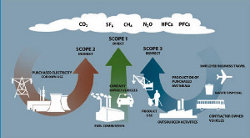 The topic of the day is trying to define what greenhouse gases (GHG) are and what they mean to the climate of the world. Whenever people start talking about climate change I often find they don’t have a lot of knowledge about the science behind their arguments, either pro or con. One of the main concepts behind the climate change science is the increase of greenhouse gases into the atmosphere.
The topic of the day is trying to define what greenhouse gases (GHG) are and what they mean to the climate of the world. Whenever people start talking about climate change I often find they don’t have a lot of knowledge about the science behind their arguments, either pro or con. One of the main concepts behind the climate change science is the increase of greenhouse gases into the atmosphere.
Now, let’s start with what a GHG is considered. Technically they are gases that can absorb and emit infrared radiation. These gases have an important role in regulating the temperature on earth in that they reflect heat in all directions. Some of this reflection is back towards the earth thus creating what is called a greenhouse effect. The more of these gases in the atmosphere the more reflection takes place.
Primary among these gases is water vapor, carbon dioxide, methane, nitrous oxide, and ozone. These actually make up a small fraction of the gases in the atmosphere but the others, Nitrogen and Oxygen predominantly, do not reflect infrared radiation and thus do not play a role in the greenhouse effect.
At question in the climate change issue is the amount of these gases in the atmosphere. The idea is that a higher amount creates more reflection which in turn keeps more heat in the planet.
The amount is controlled by something called “sources” and “sinks”. Sources produce greenhouse gases and sinks remove them.
There are numerous sources and sinks of these gases interacting in what is called the Carbon Cycle. The two major sinks are forests and the oceans. Both, through various chemical processes, absorb the vast majority of these gases. The decay of plants is the largest contributor or source of CO2 although there are other sources as well including cows, insects, volcanic activity, and human activity.
The amount of CO2 in the atmosphere has risen by a fairly startling amount since 1958 from 320 parts per million to 391 ppm. At the time of the industrial revolution around 1750 to 1850 it was at 280 ppm. That calculates out to about a 40% increase in 200+ years since the industrial revolution or an increase of about 22% in the last 50 years.
The idea, again, is that more greenhouse gases reflect more radiation and the earth gets hotter.
The argument that this increase is caused my human activity is centered around the idea that the Carbon Cycle is a relatively closed system except for catastrophic events like super volcanos and meteor strikes. Barring these major events even a small increase in source activity without a corresponding increase in sink activity will eventually cause the system to become out of balance. Imagine filling your bathtub with water and the spigot puts in exactly as much as the drain lets out. Now, add 1% more to the spigot output and decrease the drain size by 1%. The eventual result is easy to predict, it’s just a matter of time.
That humans have increased the source output of greenhouse gases through their various activities is not in dispute nor is the idea that we have decreased the sink amount. But, both changes are quite small. The question then becomes does the earth have the ability through natural sinks to rebalance the system without changing human behavior? Or, perhaps the increase in CO2 is not related to the relatively small impact of humans at all but is caused by some other, as yet not fully understood, dynamic of the planet?
Anyway, that’s GHG for you. I hope this at least clarified some of the things you hear when talking about the volatile topic of climate change and gives you information to use in your arguments, pro or con.
See you tomorrow and if you want to clarify or correct anything please do so in the comments below!
Tom Liberman
Sword and Sorcery fantasy with a Libertarian Twist